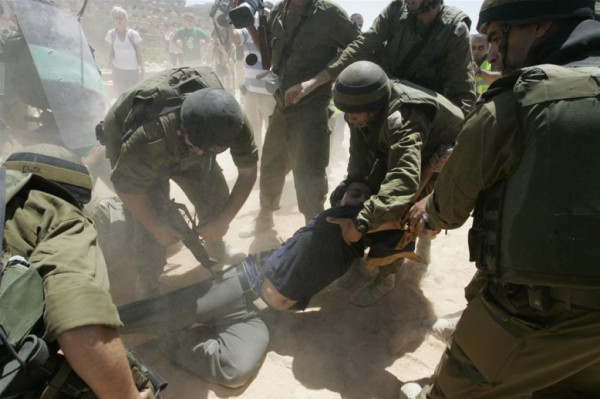By: Maen Rimawi
“I anxiously await each and every morning to hear that my son is still breathing to bring me back to life,” said the mother of prisoner Ahmad Zahran, 42, whose health is seriously deteriorating day by day after 86 days of hunger strike in protest against his administrative detention in Israeli jails without charge or trial.
Zahran’s 70-year-old mother explains how time passes by, heavy and dreary, on her as she worries all the time and lives in fear about her son’s life and is constantly overwhelmed with thoughts about his health condition.
Zahran’s mother, Raseela, said she went today to the Palestine Red Crescent Society in al-Bireh/Ramallah to appeal through media for her son’s release. The mother appealed to all the free peoples of the world and international humanitarian institutions to intervene to help release her son in order to save his life.
Patience is the only option left for the 70-year-old mother as she prays that her son’s demands for release be met so he can end his hunger strike. “Ahmad’s health has deteriorated and I appeal for everyone to ensure the release of my son from the grip of the [Israeli] occupation.”
“I’m scared something will happen to him; my daily and only concern is to be assured that he is still breathing and moving,” said Raseela after her son was taken to hospital by the Israel Prison Services few days ago following serious deterioration in his health after he stopped taking water and being unable to stand on his feet any more. He refuses to take any supplements or get physical examination.
Zahran, who worked as a greengrocer, is a father of four. He is from Deir Abu Mishaal village near Ramallah. He was previously detained on the 28th of March and placed under administrative detention. He went on a similar hunger strike that lasted for 39 days after which he was released.
He was later re-arrested and placed in administrative detention once again, prompting his return to the protest hunger strike.
“How much more can this body handle after two hunger strikes that together lasted for 120 days; My son’s body is weakening but his will remains strong,” said Zahran’s mother.
“I don’t even know what my son looks like now; his lawyers told me he now weighs around 48 kilograms and reassured me that he is fine, but I know that his health condition is serious and they are just trying to make it less hard on us,” said the mother who has not been able to visit her son since his first hunger strike.
“I wish I can see him and hold him tightly…a mother cannot handle being away from her children…his children, wife, and relatives, and even his house, they all miss him…I am still waiting to see him with us,” sorrowfully added the elderly mother.
“We will remain steadfast, and will wait for the day when my son enters his house to bring light and life to it again,” Zahran’s mother added.
According to B’Tselem statistics on Administrative Detention, “at the end of October 2019, 460 Palestinians – including three women and three minors – were held in administrative detention in Israel Prison Service (IPS) facilities.”
“In administrative detention, a person is held without trial without having committed an offense, on the grounds that he or she plans to break the law in the future. As this measure is supposed to be preventive, it has no time . The person is detained without legal proceedings, by order of the regional military commander, based on classified evidence that is not revealed to them.”
This leaves the detainees helpless – facing unknown allegations with no way to disprove them, not knowing when they will be released, and without being charged, tried or convicted, said B’Tselem, an Israeli human rights center.
Israel has claimed that it uses administrative detention only as a necessary security measure and that the decision to administratively detain an individual is made only when normal legal measures or less severe administrative measures will not attain the objective and there is no other way to ensure security. In practice, however, the authorities apply administrative detention in violation of international law. They misuse the powers granted to military commanders in the military order, said B’Tselem.



